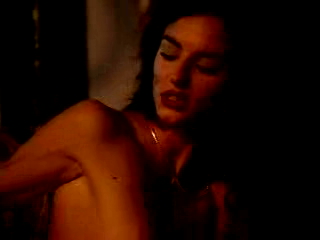The new play by Title: Point Productions, NEVER ODD OR EVEN, is a show inspired by palindromes, those weird little phrases that are the same spelled backwards or forwards. Do geese see God? Some men interpret nine memos. No trace, not one carton.
Palindromes are fun to see, they're fun to say. But say too many of them, and all sentences start to assume their weird, lurching diction, where sentence construction is purely suited to the arrangement of letters. The usual concern of diction– what is being communicated?– falls away, and a purely systemic logic takes over. It's unsettling, because it raises the question of how much day-to-day expression is indebted to the needs of the system, rather than the needs of the user.
Palindromes are the spectacle of a system confronting its own limitations. We use a very small number of symbols to write phonemes; when you have only a few pieces, those pieces will sometimes fall onto the board in comically surprising ways. We don't like to think that we're just dropping pieces randomly on the board. When we write Hamlet, it's because we wanted to write Hamlet, not because we're one of an infinite number of monkeys.
Systems have a way of drawing attention to their own limits. The paradoxes of infinite set theory seem at once impossible and plainly true– as Georg Cantor said, "Je le vois, mais ne crois pas." These paradoxes happen because math is not a physical thing that exists, subject to all reality's laws of logic and causality: math is the abstracted signifier of an order at once implacable and unreal, a set of manipulable symbols, and abstractions have a way of getting away from their source.
But it's not just an abstraction, right? Math works. It has to work. The mathematical principles work whether you're holding up a concrete bridge or a cotton blind. To witness a system eating itself is to question the system's value as signifier. Anyone who does that deserves to be thrown off one of our nice, solid, dependable bridges, into the systemless chaos of water particles surging coldly below it all.
Palindrome are prison, hallways with no beginning or end. They cannot be refuted, because they have no logic. Like Zeno's Parodox, an infinite-set paradox that makes it impossible to take a single step, a palindrome makes the very possibility of momentum seem absurd.
But we don't live in palindromes. We may fear or welcome historical cycles, cycles of violence, the reliability of human nature, the comfort of dependable genre films, the implacability of destiny. But our lives can only be cracked palindromes. Our end is generated by our beginning, but they are not the same. Death is nothing to be welcomed, but it's an effective refutation of the horrors of infinity. Nothing is infinite, really, because nothing lives forever. Much as we might, in our presumptuous imaginations, wish it to.
Our lives are a tension between our galumphing, unpredictable, infinitely varied bodies, and the graceful, dependable, tightly-bounded ouroboros we've constructed to keep us going within them, like the crisp beam of a projector washing across an actor's lumpy torso.
The play is also really funny. And scary. And it looks cool. It's a good play. It's a good life. But it's scary.













